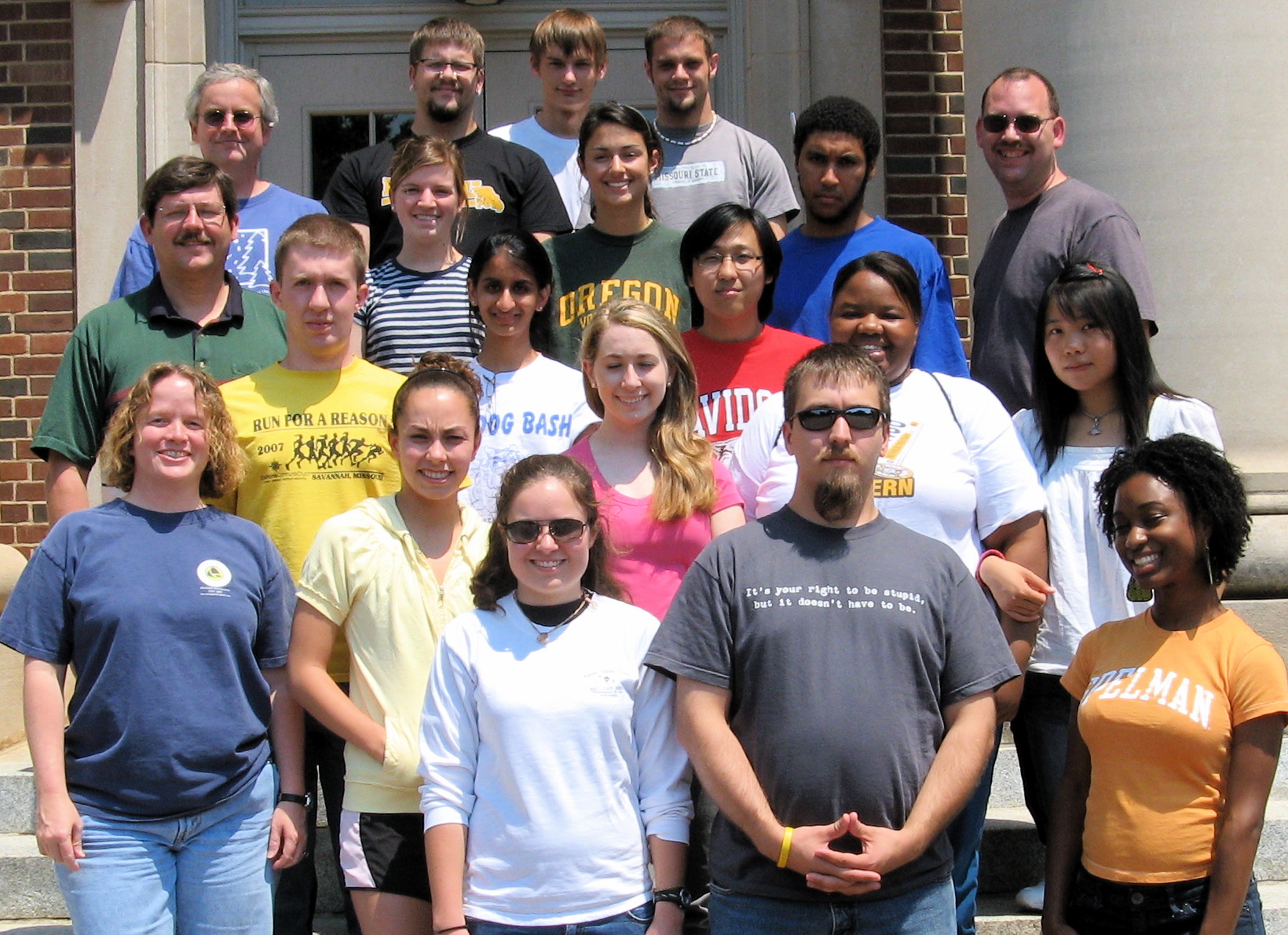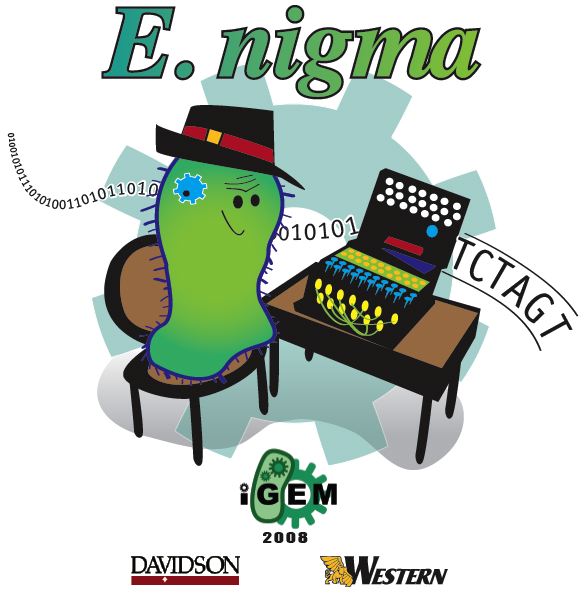Team:Davidson-Missouri Western/Team
From 2008.igem.org
| (37 intermediate revisions not shown) | |||
| Line 1: | Line 1: | ||
| + | {| style="color:#1b2c8a;background-color:#0c6;" cellpadding="3" cellspacing="1" border="1" bordercolor="#fff" width="62%" align="center" | ||
| + | ; | ||
| + | |||
| + | !align="center"|[[Team:Davidson-Missouri_Western|Home]] | ||
| + | ![[Image:Spy1.jpg|30px]] <br> | ||
| + | !align="center"|[[Team:Davidson-Missouri_Western/Team|The Team]] | ||
| + | !align="center"|[[Team:Davidson-Missouri_Western/Project|''E. nigma'' Project]] | ||
| + | !align="center"|[[Team:Davidson-Missouri_Western/New_Parts_Contributed_to_the_Registry|Parts Submitted to the Registry]] | ||
| + | !align="center"|[[Team:Davidson-Missouri_Western/Notebook|Notebook]] | ||
| + | |} | ||
| + | |||
| + | [[Image:Chambers_TeamPic_070308.jpg|right|thumbnail|500px|The Davidson / Missouri Western synthetic biology team]] | ||
| + | |||
'''Team Description''' | '''Team Description''' | ||
| - | + | Our team is composed of undergraduates and faculty from Davidson College in Davidson, North Carolina and Missouri Western State University in Saint Joseph, Missouri as well as a student from Spelman College in Atlanta, Georgia and a student from Hampton University in Hampton, Virginia. This is the third year of iGEM collaboration for Davidson and Missouri Western, but the first year of participation for each of the fifteen students. In past years, the team has worked collaboratively at a distance, meeting for the first time at the iGEM competition in Boston. This year, the team worked collaboratively from the two campuses for most of the summer but spent one week visiting each other's campuses, working shoulder-to-shoulder. The above picture was taken July 3, 2008 on the steps of the Chambers Building on the Davidson College campus. | |
| + | |||
| + | |||
| + | [[Image:E_nigma_logo.jpg|left|thumbnail|400px]] | ||
| + | |||
| + | ''' ''E. nigma'' Project Overview''' | ||
| + | |||
| + | A recent article about cryptographic hash functions challenged the world to create a better hash function, an algorithm that produces a digital fingerprint of a digitized message. We decided to work toward the design and construction of a bacterial hash function. To this end, we designed and constructed several novel dually-regulated hybrid promoters, crucial new elements in the genetic circuitry we designed to function as biological XOR gates. These gates produce a positive result in the presence of exactly one input and a negative result otherwise and can be put in sequence to create a bacterial hash function. The name of the project is a play on the name of the World War II coding machine used to encrypt military secrets. | ||
| + | '''Student Team Members''' | ||
| + | - Alicia Allen (MW), | ||
| + | James Barron (DC-HU), | ||
| + | Robert Cool (MW), | ||
| + | Kelly Davis (DC), | ||
| + | Erin Feeney (DC), | ||
| + | Andrew Gordon (MW), | ||
| + | John Igo (MW), | ||
| + | Aaron Lewis (MW), | ||
| + | Kristi Muscalino (DC), | ||
| + | Madeline Parra (DC), | ||
| + | Pallavi Penumetcha (DC), | ||
| + | Karlesha Roland (DC-SC), | ||
| + | Max Win (DC), | ||
| + | Xiao Zhu (MW) | ||
| + | '''Faculty Team Leaders''' | ||
| + | - A. Malcolm Campbell, Biology (DC); Todd Eckdahl, Biology (MW); Laurie Heyer, Mathematics (DC); Jeff Poet, Mathematics (MW) | ||
| + | <br> | ||
| - | |||
| - | |||
| - | [[ | + | {| style="color:#1b2c8a;background-color:#0c6;" cellpadding="3" cellspacing="1" border="1" bordercolor="#fff" width="62%" align="center" |
| + | !align="center"|[[Team:Davidson-Missouri_Western|Home]] | ||
| + | !align="center"|[[Team:Davidson-Missouri_Western/Team|The Team]] | ||
| + | !align="center"|[[Team:Davidson-Missouri_Western/Project|''E. nigma'' Project]] | ||
| + | !align="center"|[[Team:Davidson-Missouri_Western/New_Parts_Contributed_to_the_Registry|Parts Submitted to the Registry]] | ||
| + | !align="center"|[[Team:Davidson-Missouri_Western/Notebook|Notebook]] | ||
| + | |} | ||
Latest revision as of 23:58, 29 October 2008
| Home | The Team | E. nigma Project | Parts Submitted to the Registry | Notebook |
|---|
Team Description
Our team is composed of undergraduates and faculty from Davidson College in Davidson, North Carolina and Missouri Western State University in Saint Joseph, Missouri as well as a student from Spelman College in Atlanta, Georgia and a student from Hampton University in Hampton, Virginia. This is the third year of iGEM collaboration for Davidson and Missouri Western, but the first year of participation for each of the fifteen students. In past years, the team has worked collaboratively at a distance, meeting for the first time at the iGEM competition in Boston. This year, the team worked collaboratively from the two campuses for most of the summer but spent one week visiting each other's campuses, working shoulder-to-shoulder. The above picture was taken July 3, 2008 on the steps of the Chambers Building on the Davidson College campus.
E. nigma Project Overview
A recent article about cryptographic hash functions challenged the world to create a better hash function, an algorithm that produces a digital fingerprint of a digitized message. We decided to work toward the design and construction of a bacterial hash function. To this end, we designed and constructed several novel dually-regulated hybrid promoters, crucial new elements in the genetic circuitry we designed to function as biological XOR gates. These gates produce a positive result in the presence of exactly one input and a negative result otherwise and can be put in sequence to create a bacterial hash function. The name of the project is a play on the name of the World War II coding machine used to encrypt military secrets.
Student Team Members - Alicia Allen (MW), James Barron (DC-HU), Robert Cool (MW), Kelly Davis (DC), Erin Feeney (DC), Andrew Gordon (MW), John Igo (MW), Aaron Lewis (MW), Kristi Muscalino (DC), Madeline Parra (DC), Pallavi Penumetcha (DC), Karlesha Roland (DC-SC), Max Win (DC), Xiao Zhu (MW)
Faculty Team Leaders
- A. Malcolm Campbell, Biology (DC); Todd Eckdahl, Biology (MW); Laurie Heyer, Mathematics (DC); Jeff Poet, Mathematics (MW)
| Home | The Team | E. nigma Project | Parts Submitted to the Registry | Notebook |
|---|
 "
"

